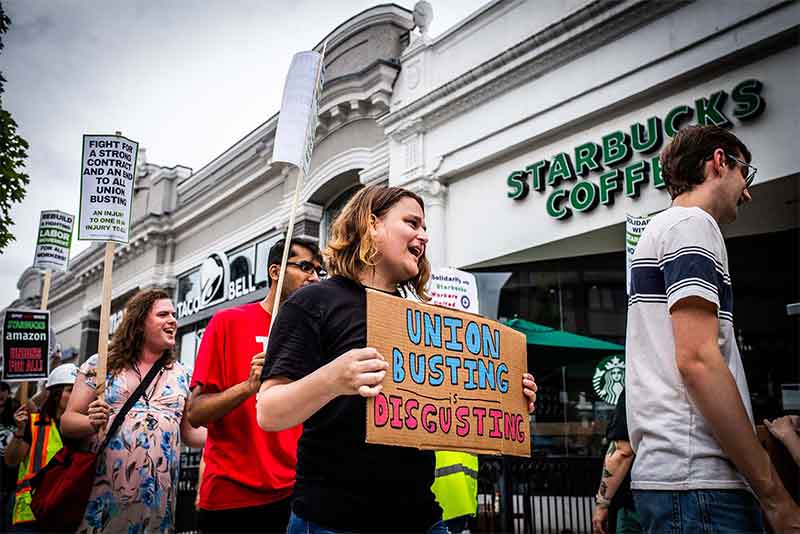
While there are plenty of current issues – Trump, Ukraine, Taylor Swift, Singapore approves insects as food (CNN), etc. – at hand, to move people’s attention away from “labor and capital”, one could still argue that we should make work and class a hot topic again.
And this might even reach beyond issues like labor shortage, AI, algorithmic management, or the humanization of the world of work.
Today, many have realized that from a trade union standpoint, only very little has been achieved in terms of what Engels once called the “condition of the working class”. Indeed, the general outlook regarding Germany’s working class seems more pessimistic than ever before.
Today, German trade unions seemingly have a very small impact on the work and life in Germany. For a start, there are fewer and fewer companies with collective bargaining regimes. Worse, there are also fewer and fewer companies engaged with one of Germany’s prime industrial relations’ achievements: co-determination.
Instead of expanding collective bargaining and trade unions, German trade unionists are forced to warn against a fascist danger – since the rise of the neofascist AfD.
Today, many industrial workers especially in the former East-Germany, vote for the right-wing extremist AfD fancying hallucination of the – never really existing – good old days with no change in sight.
As so often and perhaps ever since the advent of capitalism, the world of work has been subjected to serious changes that are influenced by technological, economic, and social transformations.
Yet, little has remained of the once great hope that a humanization of the world of work would bring progress altering the human condition. Instead, dehumanizing assembly-line work was established in industry, followed by dehumanizing desk and computer work.
At that time, trade unionists still questioned the distribution of power in companies. Today, as it seems, labor increasingly has accepted the – invented – imperatives of capitalism. Meanwhile, the organizing power of labor relations has successfully been diminished as labor became incorporated into the labor process.
Questions about the direct participation of labor in the workplace seems to no longer play any role in public discourse today, as defined by corporate media.
In other words, the – in large parts of corporate – media has effectively eliminated words like “industrial democracy” from the public domain.
In the field of scholarly-scientific engagement, the sociology of work and industrial sociology has experienced a devaluation. Today, these are rather marginalized academic subjects. Meanwhile, the neoliberal ideology has spread like wildfire ever deeper into managerialist-toxic universities.
The rise of the business school has virtually assured that the world of work is almost exclusively from the standpoint of capitalism, corporations, businesses, and the customers’ perspectives. The guiding imperative is how to make both production and products cheaper.
Even the word “worker” has disappeared having been replaced by terms such as associates, employee, staff member, team-member and human resource – a resource like a tool, implement or chattel.
The ideological goal of much of this is to make issues like profits and the distribution of power in companies disappear. Meanwhile, it can be observed that protests against the pathologies of the capitalist system and positions that are critical just to capitalism are losing support.
Just think about the global Occupy Wall Street Movement against the unleashing of financial capitalism that followed the Global Financial Crisis of 2008/2009. Let’s also think of the Arab Spring, which was then crushed.
At the beginning of the 21st century, elements of socialism still existed in Latin America. While, in Europe, the anti-capitalist attitude of the British Labour Party under Jeremy Corbyn, for example, was crushed – largely by Britain’s ultra-conservative media.
Still, there were progressive movements in Greece, Spain, and Portugal. However, much of this is gone today.
What has happened over the past years is that European progressives are much more on the defensive. The promises of European progressives to create a better society have not been fulfilled anywhere.
The headwind of capitalism’s counterforces, a neoliberal ideology, and corporate mass media proved to be too much. Ironically, this applies to Greece as well as to the former East-Germany state of Thuringia – even under the progressive Prime Minister Bodo Ramelow.
Despite the highly popular Ramelow’s government, not much has changed in Thuringia in terms of voter expectations during his progressive government, “The Left”.
Critical issues such as that of a democratization of work and the economy have been tackled far less systematically than originally anticipated. In other words, not much has changed since the days when social-democratic governments started to iron out the most devastating pathologies of capitalism.
Capitalism has always shown itself to be very capable of change. Virtually since the dawn of capitalism, people have been predicting the end of capitalism – countless times.
But, instead of dying, the system has changed, mutated, and adapted. This was flanked by the fact that it never shied away from eliminating its perceived and real enemies.
Initially, elites simply killed those protesting against capitalism such as, in the year 1848, the Paris Commune, Germany 1918/1919, Spain 1936, Chile 1973, and countless times between these periods.
These impulses of protest were initially combated by the capitalist elites and an ever-compliant (police) state. Today, most of these resistance potentials have been absorbed and merely became system-correctives for capitalism.
One of the newest examples is the Green Deal of the European Union, i.e. a pro-business ecological “reformation” of the EU. Meanwhile, even in a “pretending-to-be” environmental and pro-worker-rights country like Germany, workers’ voice has been diminished steadily and successfully.
Today, there is a real co-determination between management and unions in fewer and fewer companies. Worse, wages that have been previously negotiated through collective bargaining now hardly exist.
Meanwhile, collective bargaining in the German economy has systematically eroded and trade unions do very little to oppose this downward development.
Despite – or perhaps “because of” – the current Green-social-democrat-liberal government, there is a lack of support from politics for collective bargaining and for trade unions. As an inevitable outcome, inequalities in Germany are increasing. And unions are having a harder time than ever before.
Despite having not achieved a fundamental transition of the world of work towards humanization, a democratization of work and altering neoliberal capitalism, Germany’s trade unions celebrate themselves for being successful, for achieving solid collective bargaining outcomes for workers, and for having successfully organized plenty of strikes.
In fact, there have been rather ferocious industrial actions recently. However, despite celebrating themselves, the level of trade union organization was less than 18% in 2023, in short, only a meagre minority of workers is still unionized.
At the same time, Germany’s economy is undergoing a fundamental ecological transformation. In this rather dramatic upheaval, strong unions would be needed.
Meanwhile, there are also, albeit rather small signs of improvement. Industrial disputes in the past few months have brought many new members to trade unions for the first time and in a very long time. Germany’s Verdi union, for example, welcomed about 193,000 new members in 2023.
Even though there have been plenty of strikes resulting in wage increases, these increases were not enough to match Germany’s high inflation. As a result, workers have experienced real wage losses.
Meanwhile, Germany’s unit-labor-cost is still declining which, in turn, means companies make more profits while workers fall behind.
In many cases, trade unions’ collective bargaining outcomes failed to compensate for Germany’s rather high inflation in recent years. Simultaneously, Germany’s ecological transformation is threatened by the continuing de-industrialization of Germany.
Simultaneously, the planned switching from petrol engines to electric cars in Germany’s mighty car industry does not seem to be working at all.
Recently, the sale of electric cars has fallen dramatically which goes to show that the goals set by politicians to get millions of electric cars on the road are seemingly unattainable. Worse, there is a risk of drastic penalties if decarbonization targets aren’t achieved.
For example, the automotive industry in Germany’s most right-wing state – the former East-Germany Saxony – is moving away from (not towards!) the electric car. This could mean a disaster for car plants. Although Mercedes Benz has already corrected its plans for the expansion of electric production, VW however, has not.
What Germany really need is an “integrated system of sustainable mobility” that focuses on railway and public transport. This should go hand in hand with a “to-be-electrified” auto industry.
If Germany’s politicians fail to move away from the combustion engine, it might also indicate that many people are reluctant to change – often made fearful by Germany’s powerful right-wing tabloid press.
It culminated in a prolonged right-wing media campaign against Germany’s minister for the economy Habeck – Bild’s infamous anti-environmentalist Heizungshammer crusade.
Virtually all of this is likely to strengthen Germany’s neofascist AfD. Worse, in the recent European elections, a whopping 33% of the workers voted for the AfD.
State elections are set in the three former East-German states of Saxony, Thuringia and Brandenburg in September. In those three states, the right-wing extremists AfD is predicted to do rather well.
Whether this can still be prevented depends on how successful the counterstrategies of Germany’s democratic forces are.
Despite all the studies that have been done, despite all the warnings, and despite all the lectures in recent public polling, the far-right AfD reaches up to 30% of voter support in, for example, the former East-German state of Thuringia – despite everything.
Set against the nay-saying AfD, trade unions will have to make work and class an issue again – not nationalism, fear, hate, and migrants.
Such a counterstrategy also includes a positive vision of a social-ecological future. And that needs to incorporate a rejection of fake news, echo-chambers, and the far-right propaganda of the AfD.
Over two centuries ago, the German philosopher and poet Friedrich Schiller gave his inaugural lecture as a professor of history at the University of Jena in front of more than 600 enthusiastic students.
Subscribe to Our Newsletter
Get the latest CounterCurrents updates delivered straight to your inbox.
Schiller called on students to contribute to truth and freedom. According to Schiller, everyone – workers, trade unions, and Germany’s democratic forces on a whole – can contribute to the fight for these – very human – values.
Today, it remains imperative to revive the revolutionary spirit of Schiller, Hegel, Büchner, Marx, Bloch, Brecht, Ulrike Meinhof, Klara Zetkin, Emma Goldmann, Dutschke, and, above all: Rosa Luxemburg. As Rosa Luxemburg once said over a century ago, we face a choice between Socialism or Barbarity.
And more importantly, Luxemburg also said that there is no democracy without socialism, but also no socialism without democracy.
Perhaps, given the outcome of the recent election in neighboring France where the New Popular Front won handsomely, Germany, too, can overcome the temptations of far-right nihilism and fearmongering opting for a social-environmentalist future instead of a new version of fascist barbarity.
Born on the foothills of Castle Frankenstein, Thomas Klikauer (PhD) is the author of 995 publications, including a book on “The AfD”.
















































